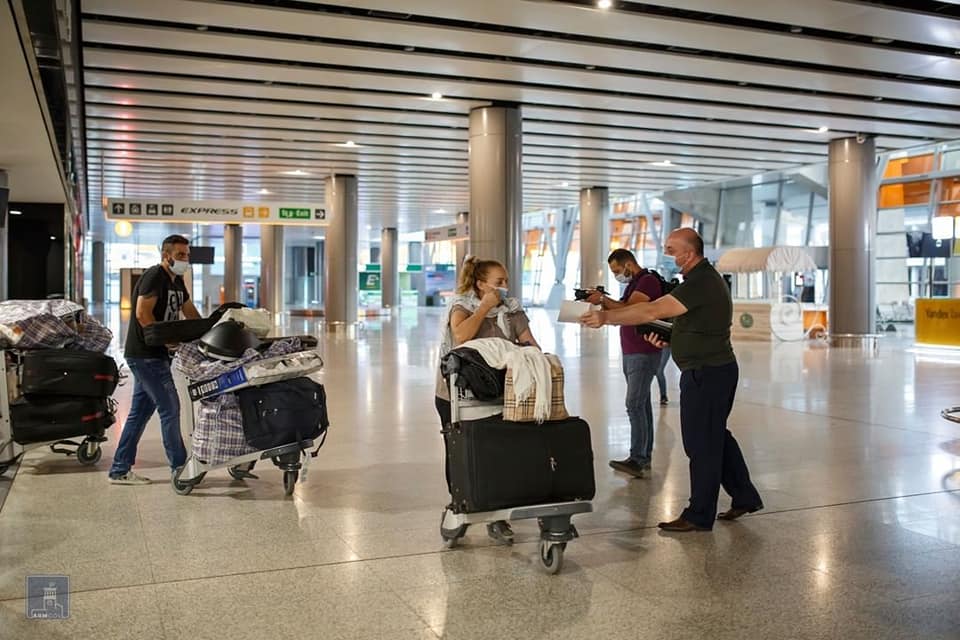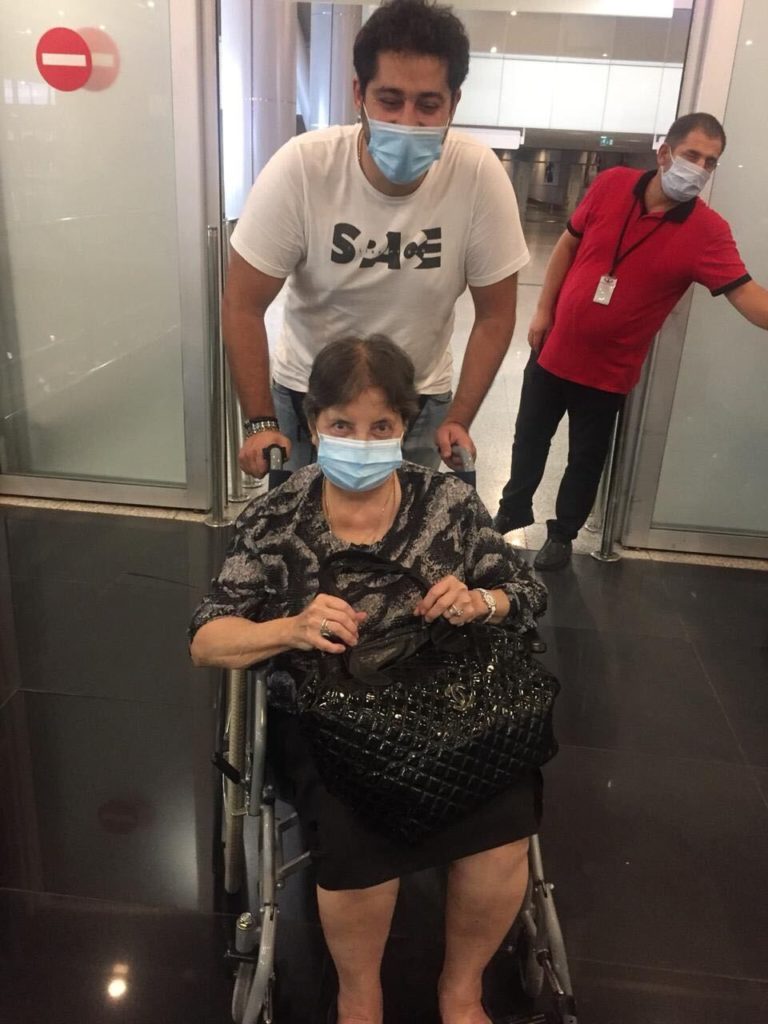YEREVAN—At least three planeloads full of emergency supplies from Armenia have been delivered to Lebanon this week, with most of the aid destined for the city’s Armenian neighborhoods most heavily affected by last week’s explosion.
Aircraft chartered by the Armenian government unloaded 36 tons of medical equipment, medicine, construction material, masks and foodstuffs—including several boxes from Artsakh—on the tarmac at Beirut’s Rafic Hariri International Airport before returning to Armenia with Lebanese-Armenian refugees looking to resettle in Armenia.
According to the Office of the High Commissioner for Diaspora Affairs, over 100 ethnic Armenians were ferried from Beirut to Yerevan aboard the three relief flights. At least 300 Lebanese-born Armenians had repatriated to Armenia in the days immediately before the explosion, fleeing the worsening socio-economic situation which has rocked the Mediterranean country for months.

High Commissioner for Diaspora Affairs Zareh Sinanyan, who is currently on the ground in Beirut as part of an Armenian government delegation to coordinate aid delivery and refugee evacuation, estimates that several hundred more Armenians have expressed a desire to repatriate to Armenia in the coming months once personal matters are settled. Sinanyan announced the Armenian government’s intention to assist them as well. “We’re ready to help those who want to remain and will tell those who wish to come to Armenia that the homeland is waiting for all Armenians with open doors,” the High Commissioner said.
Notably, in contrast to previous evacuation efforts by the Armenian government in war-torn Syria and Iraq, Sinanyan announced that evacuation flights and resettlement packages to Armenia were open to all Lebanese citizens and not limited to ethnic-Armenians. This announcement was not universally well-received in Armenia. However, political scientist Emil Sanamyan pointed out on Twitter that Armenians would benefit from tolerance towards other cultures. “What insular, xenophobic people around the world need to understand is that best measure of success of your society is desire of others to be part of it,” Sanamyan tweeted.
people in Armenia have no experience of living in multi-cultural society & strong ethnic-based biases (see e.g. recent poll). What insular, xenophobic people around the world need to understand is that best measure of success of your society is desire of others to be part of it. pic.twitter.com/EOQUpaCP1C
— Emil Sanamyan (@emil_sanamyan) August 11, 2020
The Armenian Embassy in Beirut has facilitated the arrival of affected people in Armenia, lifting visa and even passport requirements for some. Annie Tarpinian, a repatriate from Beirut now living in Armenia told the Armenian Weekly that her elderly mother Shoghig Vodalazian lived in an apartment building directly across from the port in the city’s now-obliterated Mar Mikhael neighborhood. “My mother’s building was completely destroyed,” she said. “My mom’s survival was nothing short of a miracle.” However, like many of the victims from the blast, Mrs. Vodalazian lost virtually all her possessions, including travel documents. Eleven people in her building were killed in the explosion with 30 more in her neighbourhood. Her daughters were initially informed that their mother had also died in the blast. They were very relieved to hear she had survived.
According to Tarpinian, the Armenian Embassy immediately arranged for a seat for her mother—a Lebanese citizen with no legal status in Armenia—on the first flight to Yerevan last Sunday morning, without any paperwork. Her son-in-law was also allowed to accompany her to Armenia at no expense before returning to Beirut several hours later on the next humanitarian flight.
While grateful to the Armenian government for its decisive response, the experience has nonetheless shaken Tarpinian and her mother. “When I saw my mother at the airport in Yerevan, she was visibly disturbed,” she recalled. Having since recovered from her mild physical injuries, Mrs. Vodalazian continues to show some signs of lingering trauma, being slow to respond, seemingly in a daze at times.

Several other survivors from Mrs. Vodalazian’s building were also on the flight and were greeted by representatives of the Diaspora High Commission and the Repat Armenia foundation. Prime Minister Nikol Pashinyan announced that Armenian authorities had been conducting a needs assessment study for those arriving in Armenia who have lost all their possessions, being rendered effectively homeless in order to facilitate their comfortable resettlement in Armenia. “Welcome to Armenia, dear compatriots,” Pashinyan posted on Facebook, “We are happy to receive all of you, and we’ll do everything possible to organize the return of the citizens who want to return to Armenia.”
A relief fund established by the AGBU to assist those affected by the blast has raised over $2 million in less than a week. “We have been impressed by the surge of impressive contributions in less than one week,” noted AGBU President Berge Setrakian. The Armenian Revolutionary Federation (ARF) has also mobilized to help rebuild critical structures in Beirut—including the Shaghzoyan Center in Bourj Hammoud, which houses the ARF Bureau and Central Committee offices, editorial offices of the Aztag Daily Newspaper, and the Armenian National Committee (ANC) of Middle East—all of which suffered damage in the disaster.
In Yerevan, volunteers from United Armenian Relief, a local youth-led grassroots initiative providing humanitarian aid to impacted communities in Lebanon, have set up several donation distribution points. Organizer Katya Hovnanian Alexanian has been asking donors to collect medical supplies and non-perishable food items, as well as household necessities such as battery-powered radios, flashlights, garbage bags and matches. Collected goods will be flown to Lebanon on chartered Middle East Airlines planes with assistance from the Tovmasyan Foundation and distributed on site through local charities Offer Joie and Bonheur de Ciel.
Despite these overtures, Tarpinian says she is still trying to reach the relevant state bodies in order to clarify her mother’s legal status in Armenia and receive other forms of assistance. “There are a host of issues we still have to deal with, from arranging my mother’s documents, purchasing clothes, and finding the locally available equivalents to her prescription medication,” she says.


I totally welcome Lebanese-Armenians, Syrian-Armenians, Persian-Armenians, and all the other Armenians on this planet (regardless of what religion they practice or don’t practice) to repatriate to our homeland whenever they wish. The more Armenians we have in our homeland, the better off we will all be.
HASTAT…MENK PETKA SHATANANK.
Hopefully the Armenians of Armenia treat the new diasphora Aremenians better than they treated the poor Syrian Armenian refugees.